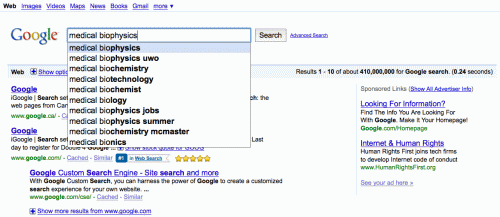Google Tricks You Can Use For Your Research (And To Get The Latest Twilight Gossip)
 Do you want to know if SCN2A has been expressed in HeLa cells? You can find your answer to this question and others using a trick explained by EP FELLOW.
Do you want to know if SCN2A has been expressed in HeLa cells? You can find your answer to this question and others using a trick explained by EP FELLOW.
Here's how:
While specialised search engines will always have their place, I find myself drifting more and more toward google for the thorough, 'all document' search. Here is a simple example - I want to know if SCN2A (the gene encoding the Nav1.1 channel) has been expressed in HeLa cells. My first destination is PubMed:
- SCN1A HeLa ? 1 result, a 'false' positiveNext, I'll try google:
- SCN1A HeLa ? 6070 results
Far too many to search through. Most of the results appear to be mentions of one or both words on the same web page.
If I think about what I am actually search for it is: "We expressed SCN1A in HeLa cells…". I could search for that exact expression (0 results), but I know that there are a hundred different ways of saying the same thing. I would like to search for all those web pages where SCN1A is in the same sentence as HeLa cells. There is at least one commercial solution out there - the excellent DevonAgent, which I suggest is worth a look. But a similar, though limited, functionality is available in Google.
- "SCN1A * HeLa" ? 1 result, a 'false' positive
(Enter with the quotation marks). This produces all the webpages with SCN2A preceding HeLa in the same sentence; of course HeLa may precede SCN2A, so I also need to enter the search phrase:
- "HeLa * SCN1A" ? 0 results
This gives me some confidence that SCN1A has probably not been expressed in HeLa cells; at least not documented to have been expressed. I realise that this method may result in some misses - when HeLa and SC12A are split by a single period for instance. But it is a far better method than the standard google search and has many uses beyond science.
I long for the day when one can supply a search modification in the google search bar along the lines of 'search for these two words, and only return those webpages where they are within [x] words of each other'.
Google Trick for Science Search [via EP FELLOW]
